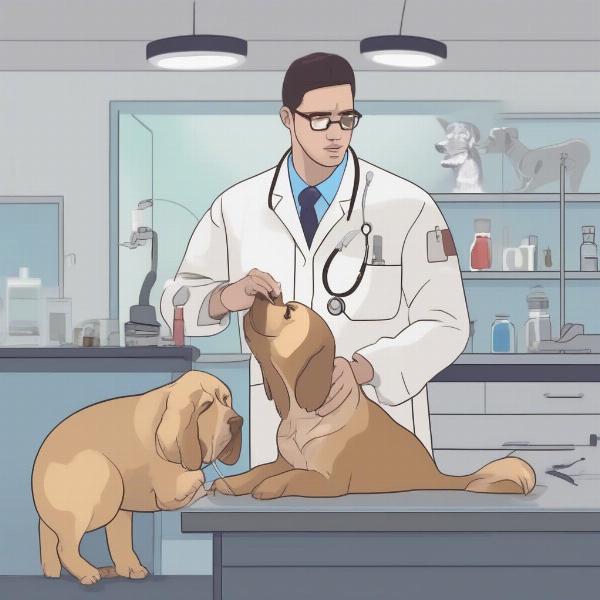Psyllium for dogs is a natural, plant-based fiber supplement that can offer a range of health benefits, particularly for digestive issues. This guide will explore the uses, benefits, and potential risks of psyllium for dogs, providing practical advice on how to safely incorporate it into your pet’s diet. Whether you’re dealing with constipation, diarrhea, or looking for ways to support your dog’s overall digestive health, understanding psyllium can be a valuable tool.
Psyllium, derived from the husks of Plantago ovata seeds, is a bulk-forming laxative that absorbs water in the digestive tract. This increased water absorption softens the stool, promotes regularity, and can ease both constipation and diarrhea. While generally safe, it’s important to consult with your veterinarian before adding psyllium to your dog’s diet, especially if they have pre-existing health conditions.
Understanding the Benefits of Psyllium for Dogs
Psyllium isn’t just for occasional digestive upset. It can be a beneficial supplement for a variety of conditions, supporting overall gut health and even contributing to weight management.
Addressing Constipation and Diarrhea
Psyllium’s ability to regulate bowel movements makes it a useful tool for managing both constipation and diarrhea in dogs. For constipation, the added fiber bulks up the stool, making it easier to pass. In cases of diarrhea, psyllium can absorb excess water in the intestines, firming up the stool and reducing frequency.
Supporting Digestive Health
Beyond addressing specific digestive issues, psyllium can promote overall gut health by supporting a healthy balance of intestinal flora. The fiber in psyllium serves as a prebiotic, nourishing beneficial bacteria in the gut and contributing to a healthy digestive system.
Aiding in Weight Management
For overweight dogs, psyllium can be a helpful addition to a weight management plan. The fiber creates a feeling of fullness, which can help reduce overeating. This, combined with a balanced diet and regular exercise, can contribute to healthy weight loss.
How to Use Psyllium for Dogs Safely
While psyllium is generally safe for dogs, it’s crucial to follow proper dosage guidelines and monitor your pet for any adverse reactions.
Choosing the Right Form of Psyllium
Psyllium for dogs is available in various forms, including powder, capsules, and wafers. Powder is often the most convenient option, as it can be easily mixed with food. Consult your veterinarian to determine the best form and dosage for your dog’s specific needs.
Introducing Psyllium Gradually
When introducing psyllium, start with a small dose and gradually increase it over several days. This allows your dog’s digestive system to adjust and minimizes the risk of side effects like gas or bloating.
Ensuring Adequate Hydration
Because psyllium absorbs water, it’s essential to ensure your dog has access to plenty of fresh water. Dehydration can exacerbate digestive issues and reduce the effectiveness of psyllium.
Potential Risks and Side Effects of Psyllium for Dogs
While psyllium is generally safe, some dogs may experience mild side effects, including gas, bloating, or vomiting. In rare cases, allergic reactions can occur. If you observe any adverse reactions, discontinue use and consult your veterinarian.
Monitoring for Allergic Reactions
Signs of an allergic reaction to psyllium can include itching, hives, swelling, or difficulty breathing. If you notice any of these symptoms, seek immediate veterinary attention.
Avoiding Psyllium in Certain Cases
Dogs with certain medical conditions, such as megaesophagus or bowel obstructions, should not take psyllium. Always consult your veterinarian before giving psyllium to your dog, especially if they have any underlying health issues.
 Veterinarian examining dog for psyllium use
Veterinarian examining dog for psyllium use
Conclusion
Psyllium can be a valuable tool for managing digestive issues and supporting overall gut health in dogs. By understanding the benefits, proper usage, and potential risks, you can make informed decisions about incorporating psyllium into your dog’s care. Remember to always consult with your veterinarian before starting any new supplement.
FAQ
- How much psyllium should I give my dog? The correct dosage of psyllium depends on your dog’s size and individual needs. Always consult your veterinarian for guidance.
- Can I give my dog psyllium every day? While psyllium can be used daily, it’s best to consult your veterinarian to determine the appropriate frequency for your dog.
- What are the signs of a psyllium allergy in dogs? Signs of an allergy can include itching, hives, swelling, and difficulty breathing.
- Can psyllium help my dog lose weight? Psyllium can contribute to weight loss by promoting a feeling of fullness, but it should be used in conjunction with a balanced diet and exercise.
- Where can I buy psyllium for my dog? Psyllium for dogs can be purchased at most pet supply stores and online retailers.
- Can I mix psyllium with my dog’s medication? It’s essential to consult your veterinarian before mixing psyllium with any medication.
- What happens if my dog eats too much psyllium? Excessive psyllium intake can lead to digestive upset. Contact your veterinarian if you suspect your dog has consumed too much.
ILM Dog is your trusted resource for expert advice on dog care and wellbeing. We offer comprehensive information on dog breeds, health, training, nutrition, grooming, and much more. From puppy care to senior dog care, we’re here to support you every step of the way. For personalized guidance on psyllium or any other aspect of dog care, contact our experts at [email protected] or call +44 20-3965-8624. Visit ILM Dog for more valuable resources and insights.